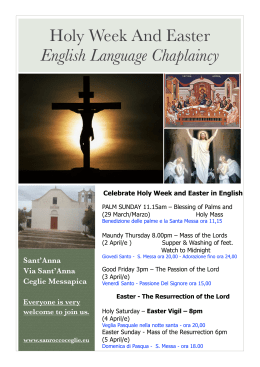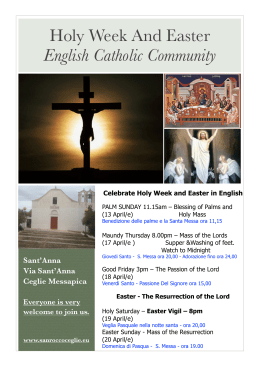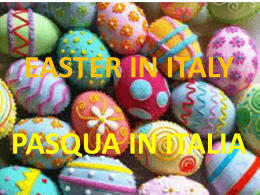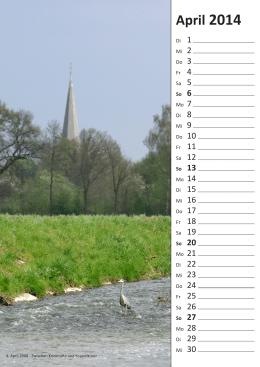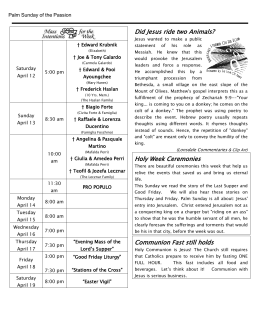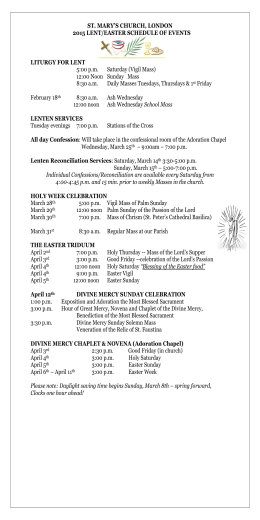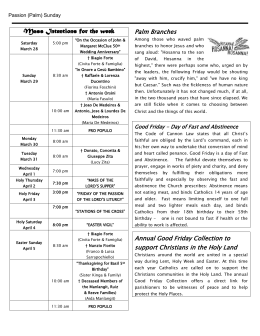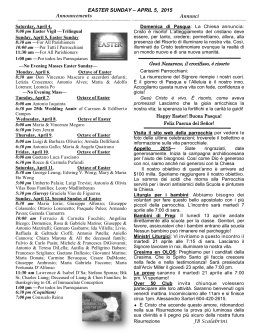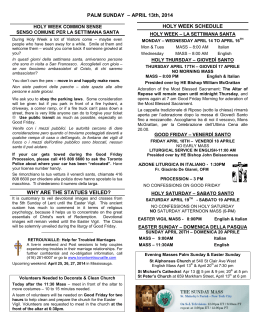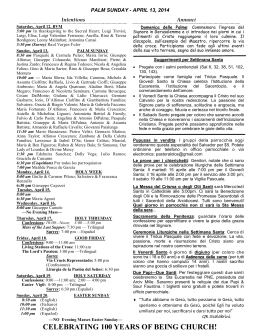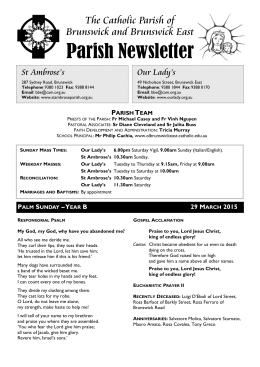MARCH 29th, 2015 March 30th –April 5th 2015 What is the Triduum and when does Lent end? Lent ends on Holy Thursday. Holy Thursday evening through Easter Sunday is the three day period called the Triduum where we remember Christ’s passion, death and resurrection. What is Holy Thursday? It is at this special celebration that we remember and celebrate Jesus’ gift of the Eucharist. It is the night when we renew our mandate to serve one another in the washing of the feet, which first took place at the Last Supper. What is Good Friday? Good Friday is the day that we recognize as the day that Jesus died on the cross. What are the Stations of the Cross? The Stations of the Cross commemorate Jesus’ journey from Pilate’s court to Calvary where he was crucified. Jesus’ mother Mary is believed to have often retraced the sorrowful way her Son made of Good Friday. What is Holy Saturday? Commemorates the period where Jesus’ body lay in the tomb. Easter begins with the Easter Vigil – during these services, catechumens (those preparing to join the Catholic Church) are baptized and brought into full Communion with the Catholic Church. What is Easter Sunday and how does it differ from the Easter Season? Easter Sunday is the day when Catholics celebrate Christ’s resurrection from the dead. The Easter Season totals 50 days - Easter Sunday to Pentecost Sunday. The Easter Season is a time for reflection on and deepening of our awareness of the mysteries prepared for in Lent and celebrated at the Triduum. What is fast and abstinence? Ash Wednesday and Good Friday are universal days of fast and abstinence. Catholics still consider Fridays throughout Lent as days of abstinence. Anyone over the age of 18 and under the age of 59 are obliged to fast and abstain. Fasting, in the Latin Church, is the limitation of food and drink – typically to one main meal and two smaller meals, with no solid foods in between. Abstaining, in this context, is the refraining from certain kinds of food or drink, typically meat. In lieu of fasting, one may substitute works of charity. Sacrament of Confession Available March 30th 30th-1st, 2015 (Monday (Monday-Wednesday) 30 minutes before the Mass in the morning and evening Monday: March 30th 8:00am- +Walter Lowe 7:00pm- +Manuel De Quintal Tuesday: March 31st 8:00am- +Caridad +Aderito +Marciano Camposano 7:00pm- +Dominic +Ana Doria Wednesday: April th 8:00am7:00pmThursday: April 2nd 8:00am- No mass 7:30pm- Holy Supper Mass Friday: April 3rd Good Friday 8:00am- no mass 3:00pm- For the community of OLA 5:00pm - Italian Saturday: April 4th 8:30am- No Mass 8:00pm- For the community of OLA Sunday: April 5th Easter Sunday 9:00am- For the community of OLA 10:30am - +John & Tomaso Spalvieri 12:00pm – +Agnes Braganza DIVINE MERCY SUNDAY April 12th, 2015 at 3:00PM Exposition / Benediction of the Blessed Sacrament/ Divine Mercy Chaplet EVERYONE IS WELCOME! Refreshments in the parish hall (Please bring some sweets) Let us pray! for those who are sick members of our parish and those who love and minister to them: Thank you for your Offerings Sunday Collection $ 6,055.50 Maintenance $ 1,016.50 Sharelife $ 375.00 PALM SUNDAY OF THE PASSION OF THE LORD TRIDUUM AND EASTER SCHEDULES HOLY THURSDAY - APRIL 2ND, 2015 7:30pm - Our Lord’s Supper / The washing of the feet and the Exposition of the Blessed Sacrament until 12:00midnight. DOMENICA DELLA DIVINA MISERICORDIA 12Aprile alle 3:00 del pameriggio ci sará la funzione della la Divina Misericordia con preghiere, canti e tanta devozione. Dopo la funzione seguirá un rinfresco nella sala parrocchiale. Non mancate a quest’ appuntamenta annuale, e se potete, portate qualche dolcetto. GOOD FRIDAY SERVICES– APRIL 3RD, 2015 12:30pm—Italian 3:00pm -- English 7:00pm -- Stations of the Cross (Bilingual: Italian-English) 9:00pm – Tamil EASTER VIGIL— SATURDAY , APRIL 4TH, 2015 8:00PM — Bilingual (Italian-English) 11:00pm —Tamil NO 5:00pm MASS EASTER SUNDAY, APRIL 5TH, 2015 9:00AM - English 10:30AM – Italian 12:00NOON — English Working wonders in our livelihoods… When he was presented with a top youth achievement award at a recent gala at The Carlu, Kiwayne was only a short distance from the streets where he had been homeless, and a world away. In the building’s food court a few years ago, he recalls falling asleep at the table – exhausted – trying to avoid having to go back outside. “I was going down the wrong path and didn’t know if I’d live to be 21,” he says. But for the past two years since moving into his own place, Kiwayne has been studying construction engineering at George Brown College and working part-time at the Provincial Advocate’s Office. Kiwayne grew up in foster care and, at 17, he found himself on the street until a friend told him about Covenant House. “Covenant House gave me stable housing that allowed me to go back to school and learn life skills.” says Kiwayne. Next ShareLife Sunday – April 12, 2015 Please give generously. You can work wonders! DOMENICA DELLE PALME È allo stesso tempo l’ora della luce e l’ora delle tenebre.L’ora della luce, poiché il sacramento del Corpo e del Sangue è stato istituito, ed è stato detto: “Io sono il pane della vita... Tutto ciò che il Padre mi dà verrà a me: colui che viene a me non lo respingerò... E questa è la volontà di colui che mi ha mandato, che io non perda nulla di quanto mi ha dato, ma lo risusciti l’ultimo giorno” (Gv 6,35-39). Come la morte è arrivata dall’uomo così anche la risurrezione è arrivata dall’uomo, il mondo è stato salvato per mezzo di lui. Questa è la luce della Cena. Al contrario, la tenebra viene da Giuda. Nessuno è penetrato nel suo segreto. Si è visto in lui un mercante di quartiere che aveva un piccolo negozio, e che non ha sopportato il peso della sua vocazione. Egli incarnerebbe il dramma della piccolezza umana. O, ancora, quello di un giocatore freddo e scaltro dalle grandi ambizioni politiche.Lanza del Vasto ha fatto di lui l’incarnazione demoniaca e disumanizzata del male.Tuttavia nessuna di queste figure collima con quella del Giuda del Vangelo. Era un brav’uomo, come molti altri. È stato chiamato come gli altri. Non ha capito che cosa gli si faceva fare, ma gli altri lo capivano? Egli era annunciato dai profeti, e quello che doveva accadere è accaduto. Giuda doveva venire, perché altrimenti come si sarebbero compiute le Scritture? Ma sua madre l’ha forse allattato perché si dicesse di lui: “Sarebbe stato meglio per quell’uomo se non fosse mai nato!”? Pietro ha rinnegato tre volte, e Giuda ha gettato le sue monete d’argento, urlando il suo rimorso per aver tradito un Giusto. Perché la disperazione ha avuto la meglio sul pentimento? Giuda ha tradito, mentre Pietro che ha rinnegato Cristo è diventato la pietra di sostegno della Chiesa. Non restò a Giuda che la corda per impiccarsi. Perché nessuno si è interessato al pentimento di Giuda? Gesù l’ha chiamato “amico”. È veramente lecito pensare che si trattasse di una triste pennellata di stile, affinché sullo sfondo chiaro, il nero apparisse ancora più nero, e il tradimento più ripugnante? Invece, se questa ipotesi sfiora il sacrilegio, che cosa comporta allora l’averlo chiamato “amico”? L’amarezza di una persona tradita? Eppure, se Giuda doveva esserci affinché si compissero le Scritture, quale colpa ha commesso un uomo condannato per essere stato il figlio della perdizione? Non chiariremo mai il mistero di Giuda, né quello del rimorso che da solo non può cambiare nulla. Giuda Iscariota non sarà più
Scaricare
